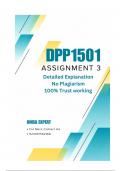Exam (elaborations)
DPP1501 Assignment 3 (COMPLETE ANSWERS) 2024 - DUE 29 July 2024
- Course
- Institution
DPP1501 Assignment 3 (COMPLETE ANSWERS) 2024 - DUE 29 July 2024 Question 1 1.1 Read the information in the case study below to answer the questions that follow. Case study: Empowering learners with disabilities in Africa Introduction: In many African countries, learners with disabilities face var...
[Show more]



